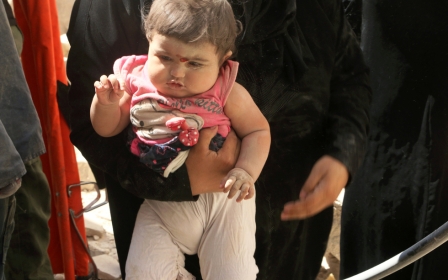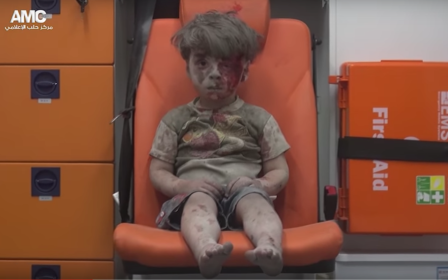Air strike kills seven members of one family in Aleppo: Rebels

Rebels in Aleppo claim that pro-government air strikes killed seven members of the same family, six of them children, on Saturday morning as pressure grows for a ceasefire in the city.
The local rebel co-ordination committee said the strike, allegedly carried out using a barrel bomb, killed the wife and six children of local media activist Ali Abu al-Jawd when his house in the al-Jaloum district of the Old City was hit on Saturday morning.
Jawd was reportedly not in the house when it was hit.
Translation: Condolences to our brother the media activist Ali Abu al-Jawd, who lost seven members of his family when his house in Old Aleppo was bombed at dawn this morning
International attention was refocused on the northern Syrian city of Aleppo after the image of five-year-old Omran Daqneesh, dazed and bloodied in the back of an ambulance after an air strike hit his home, shocked viewers around the world. Reports surfaced on Saturday that his 10-year-old brother, Ali, has now lost his life and died from his wounds.
According to the Syrian Observatory for Human Rights, a UK-based watchdog, more than 300 civilians have been killed in a three-week surge of fighting and bombardment in Syria's devastated Aleppo city.
The battle for Syria's second city has killed 333 civilians since 31 July, when rebels launched a major push to break a government siege of districts under their control.
The toll includes 165 civilians, among them 49 children, killed in opposition fire on the city's government-held western districts.
Another 168 civilians died in Russian and government air strikes and shelling on its rebel-controlled eastern neighbourhoods, the Observatory said on Saturday. Another 109 people were killed in bombardment across the rest of Aleppo province during the same period.
Russia has been carrying out air raids in support of President Bashar al-Assad's forces in Syria since September 2015.
Russian planes have been accused of launching the strike that hit Daqneesh's home. Russia has denied this, saying its forces “never work on targets that are inside settled areas”.
Defence ministry spokesperson Igor Konashenkov released a statement on Friday accusing the Western media of exploiting the suffering of Omran Daqneesh in the name of “cliched anti-Russian propaganda”.
Konashenkov suggested that a strike may not have taken place in that area at all, citing footage that showed houses close to Daqneesh's with their windows unbroken.
"If a strike really did take place," he said, it was not an aerial strike but either a gas cylinder "used in large quantities there by terrorists" or a mortar shell.
Russia, a key backer of President Assad, said on Friday that it was willing to back a 48-hour humanitarian ceasefire to allow aid to enter the besieged city.
The first such “humanitarian pause” could come as early as next week, Russia's Ministry of Defence said in a statement.
The EU is calling for an "immediate halt to the fighting" in the city to allow medical evacuations, aid deliveries and repairs to essential water and electricity infrastructure.
New MEE newsletter: Jerusalem Dispatch
Sign up to get the latest insights and analysis on Israel-Palestine, alongside Turkey Unpacked and other MEE newsletters
Middle East Eye delivers independent and unrivalled coverage and analysis of the Middle East, North Africa and beyond. To learn more about republishing this content and the associated fees, please fill out this form. More about MEE can be found here.



